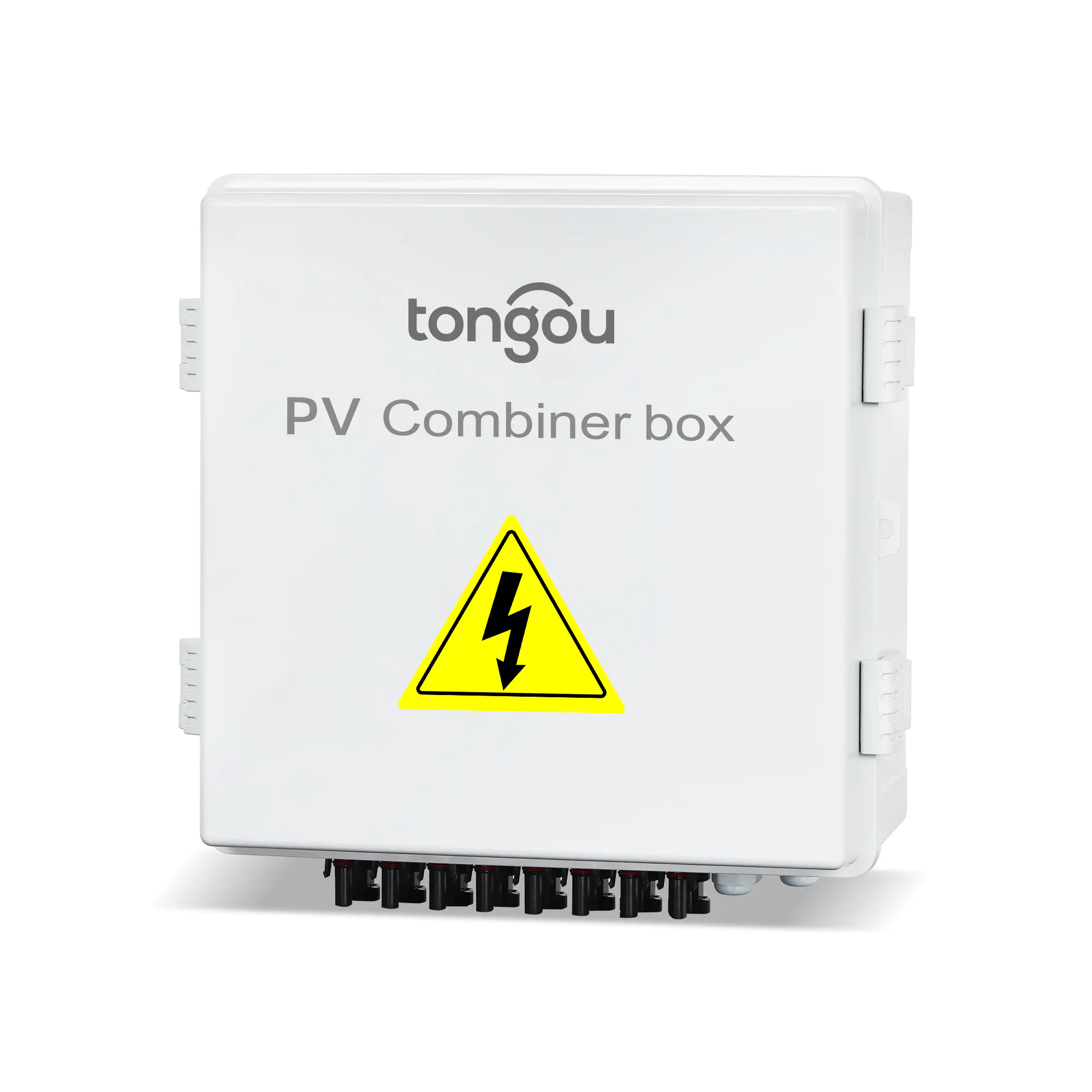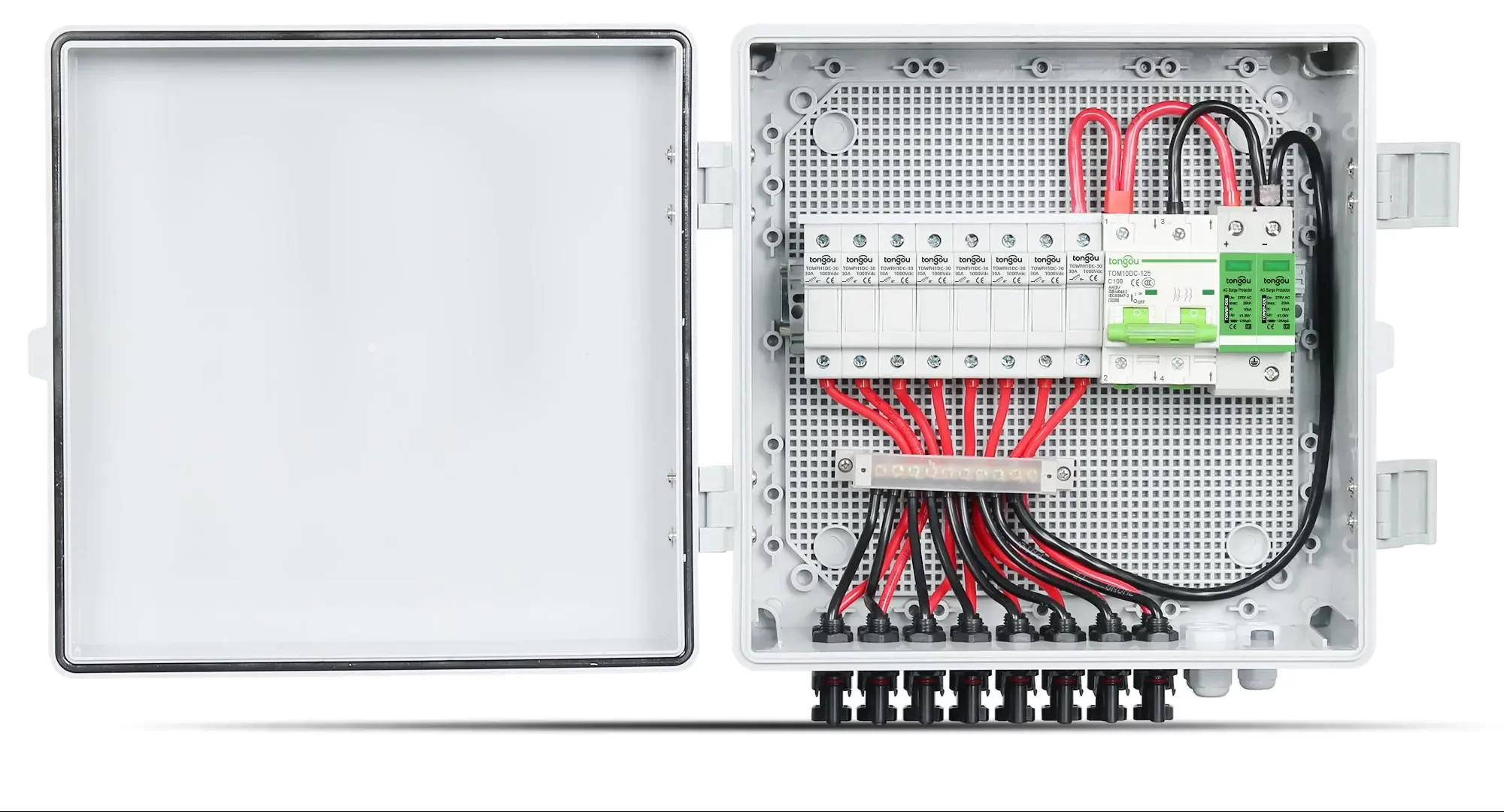The solar combiner box is like a junction box, which combines all the outputs from the solar panels into one line, and then uniformly inputs into the inverter, which reduces the number of wires and saves material costs. The basic components in a solar PV combiner box include PV string fuses, DC molded case circuit breakers, and DC surge protection devices. There is also other additional equipment, such as monitoring devices.
Depending on the environment and conditions of use, the solar combiner box also has a variety of specifications and sizes. It is necessary to fully understand the functions of the components in them in order to choose and match the ideal product.

Before delving into the details of solar combiner boxes, we also need a brief understanding of photovoltaic systems: Photovoltaic systems, also known as photovoltaic systems or solar power systems, are electrical systems designed to provide usable solar energy through photovoltaic power generation.
Because one of the functions of the solar combiner box is to integrate excessive wires. Basically, in the case of fewer than 4 strings, the combiner box is not necessary. But the solar combiner box also has other functions, such as:
If you have a need for the above functions of the solar PV combiner box, then you need to understand and purchase this product.
1. Collection: Individual solar panels produce DC electricity, which is fed into the combiner box through separate inputs.
2. Combination: Inside the combiner box, the output from each panel is combined into a single DC output.
3. Protection: The box houses protective devices like fuses or circuit breakers to guard against overcurrent conditions.
4. Monitoring: Advanced combiner boxes also include monitoring features for tracking performance and diagnosing issues.

The basic components in the solar combiner box are as follows:
DC molded case circuit breakers can be used to protect circuits in solar power generation systems. The rated current of the Tongou DC molded case circuit breaker is between 63A and 630A, which is suitable for higher-power photovoltaic systems.
The photovoltaic string fuse will blow the fuse in the event of an accident, preventing the reverse current from continuing to flow, and protecting cables and other equipment from further damage.
When there is transient overvoltage on the protected line, the surge protector will conduct the surge into the ground to protect the rear equipment from the surge.
First of all, we need to determine where the purchased combiner box is used, what configuration it needs, and purchase it as needed.
Want simple or feature-rich? Because of the installation location, do you need a large box or a small box? Is the combiner box mounted on the wall or placed on the floor? Basically, each manufacturer does not necessarily have a ready-made combiner box suitable for each situation. When the situation is complicated, the combiner box needs to be customized to meet the needs.
In order to facilitate subsequent maintenance, you can install monitoring equipment on the combiner box. After installing the monitoring equipment, the voltage, current and even temperature in the combiner box can be monitored remotely, and faults can be found in time so that they can be repaired in time.
Secondly, for the combiner box itself, we need to pay attention to the following points:
Because the combiner box is a product that needs to be used for a long time. If the quality is not good, a frequent replacement will only increase the cost in the end.
Every country has more or less different product standards, so make sure that the products you choose and buy meet your local requirements and regulations.
The use environment of solar combiner boxes will vary from place to place, and a good quality solar combiner box can be compatible with different environments.
Source: Envato
Solar combiner boxes are generally installed outdoors, and affected by ambient temperature, humidity, and natural disasters, they will definitely cause damage to the solar PV combiner box. In order for the components in the solar combiner box to continue to work normally, it is necessary to maintain the solar PV combiner box.
Note: For the sake of your own safety, you must pay attention to disconnect the solar combiner box from the power supply before maintenance, and perform maintenance work seriously and responsibly.
It is important to keep the inside of the combiner box clean. Cleaning can be done with soap and a soft damp towel, but please keep the combiner box dry with a dry towel after cleaning.
Please double-check whether the combiner box has stopped working. Wear insulating gloves and check the connected wires for looseness and oxidative deterioration in exposed areas. The replacement of materials must be done by people with professional electrical knowledge.
After the fuse is blown, it cannot be used again, it can only be replaced. Before replacing the fuse, be sure to pay attention to the circuit breaker, disconnect the circuit breaker, and check with a multimeter before replacing the fuse.
Check whether the window of the surge protector is green. If it is red, it means that it has failed and the module needs to be replaced.
After maintenance, check again that all work has been done.
Using solar power is sustainable, and a good quality solar combiner box can effectively protect the photovoltaic system, improve the efficiency of the solar system, and protect other equipment such as rear inverters from transient overvoltage.
If you have any other questions, please contact Tongou. Tongou will answer your doubts and provide corresponding complete sets of equipment according to your actual situation.
Hope this article is helpful to you.
Outdoor vs. Indoor
Outdoor: Requires a weather-resistant and UV-protected enclosure. Typically installed near the solar array.
Indoor: Can be installed in more controlled environments without the need for extensive weatherproofing.
Environmental Considerations
Temperature Range: Ensure the combiner box can operate within the site’s temperature range.
Exposure to Elements: For outdoor installations, consider protection against rain, dust, hail, and potential impacts.
Q: Can a solar combiner box improve the efficiency of my solar system?
A: Indirectly, yes. By minimizing electrical losses and providing a means for effective system monitoring, a combiner box can contribute to maintaining the optimal performance of your solar installation.
Q: How many strings of solar panels can a solar combiner box handle?
A: It varies. Solar combiner boxes are available in various capacities, with some models accommodating 20 strings or more. Selection should be based on your specific system requirements.
Q: Is a solar combiner box necessary for all solar PV systems?
A: While small, single-string systems may not require a combiner box, they become increasingly critical as the number of strings and complexity of the system grow. For medium to large installations, their benefits in safety, efficiency, and convenience are undeniable.
A solar combiner box is a pivotal component in the architecture of a photovoltaic solar system, integral not just for operation but for the safety and longevity of the installation. Understanding its role, benefits, and selection criteria is crucial for anyone looking to optimize their solar energy setup. With the information provided in this guide, you’re now better equipped to appreciate the nuances of solar combiner boxes, ensuring your solar system operates efficiently and safely for years to come.
| M | T | W | T | F | S | S |
|---|---|---|---|---|---|---|
| 1 | ||||||
| 2 | 3 | 4 | 5 | 6 | 7 | 8 |
| 9 | 10 | 11 | 12 | 13 | 14 | 15 |
| 16 | 17 | 18 | 19 | 20 | 21 | 22 |
| 23 | 24 | 25 | 26 | 27 | 28 | |

tongou was established in 1993 and is the trademark of Changyou Technology. We position ourselves as providers of intelligent product solutions for high and low voltage electrical systems, taking on solving customers’ pressures and challenges as our responsibility and creating value for them. We utilize intelligent products to serve global customers, making life smarter and more convenient to benefit your life.
Paidong Industrial Zone Qiligang,Yueqing City,Zhejiang province,China.
Sales: [email protected]
After-sales: [email protected]
© 2025 Changyou Technology. All Rights Reserved.


